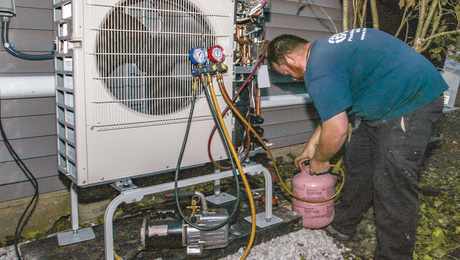*
Because of the power struggles in California, I am thinking about buying a gererator. How big a generator do I need to run a 20 cu/ft fridge?
Not for commercial use, just want to keep the milk and ice cream.
Thanks.
*
Because of the power struggles in California, I am thinking about buying a gererator. How big a generator do I need to run a 20 cu/ft fridge?
Not for commercial use, just want to keep the milk and ice cream.
Thanks.

As the industry phases out R-410A due to environmental regulations, new refrigerant options—R-32 and R-454B—offer lower global warming potential, but the best choice depends on your technician's training and familiarity with these newer systems.

"I have learned so much thanks to the searchable articles on the FHB website. I can confidently say that I expect to be a life-long subscriber." - M.K.
Get home building tips, offers, and expert advice in your inbox

Dig into cutting-edge approaches and decades of proven solutions with total access to our experts and tradespeople.
Start Free Trial Now
Get instant access to the latest developments in green building, research, and reports from the field.
Start Free Trial Now
Dig into cutting-edge approaches and decades of proven solutions with total access to our experts and tradespeople.
Start Free Trial NowGet instant access to the latest developments in green building, research, and reports from the field.
Start Free Trial Now© 2025 Active Interest Media. All rights reserved.
Fine Homebuilding receives a commission for items purchased through links on this site, including Amazon Associates and other affiliate advertising programs.
Get home building tips, offers, and expert advice in your inbox
Become a member and get instant access to thousands of videos, how-tos, tool reviews, and design features.
Start Your Free TrialGet complete site access to expert advice, how-to videos, Code Check, and more, plus the print magazine.
Already a member? Log in
Replies
*
If you're talking about just occasional home use, 4500 watts will run most equipment and "may" start a small airconditioner. 6000 watts is better, it won't cause as much surge when you switch things off and on.. Like when the compressor of the refrigerator kicks on and off. If you want something to run for more then a week at a crack, consider diesels and go for 10,000 watts. Check back in the midwest for standby generators that the phone company retires. They are often in great shape with just a few hundred hours on them and they are retired because their rules demand replacement after so many years regardless of the condition. check with a company called Ziegler in Minnesota, at one time there were plenty of them sitting around.
*Frenchy is right, an "average" house will function on or with a 5000 watt. Keep in mind you have a lot more things in your house other than a refrigerator that make life comfortable, lights are a good thing, mabey a radio or TV for news, hot water is a plus...at least for your wife or co-workers. Don't forget the hot tub and computer, bigscreen and...All serious, I would opt for a 10,000 when talking about powering a house for extended periods of time, and if you expect to be without power for a long time, hard wire it to the breaker box with some form of security, (generators may be a pretty hot ticket for the thieving crowd) chain and lock, bolt down, mabey its own building so as to knock down noise levels.
*While it would be convenient to run the generator through your house wiring, there are some very specific requirements that, by code and for the safety of utility workers, have to followed. Since your expected power failures will be this summer, I'd just run a heavy (12 gauge or better) extension cord to the fridge and 14 gauge for lights and TV. Unplug the appliance from the wall receptacle and plug it into the extension cord. Use as short a cord as will work to minimize voltage drop. Try to locate the generator downwind - they are not as clean burning as a Honda car by a long shot.In the 4500 - 5000 watt range, look for "extended run" features like a 5-gallon tank and low-oil automatic shut-off. Anything bigger will usually have these features. Fueling up a gallon at a time is a drag as is toasting the motor when the oil gets low. -David
*
Because of the power struggles in California, I am thinking about buying a gererator. How big a generator do I need to run a 20 cu/ft fridge?
Not for commercial use, just want to keep the milk and ice cream.
Thanks.